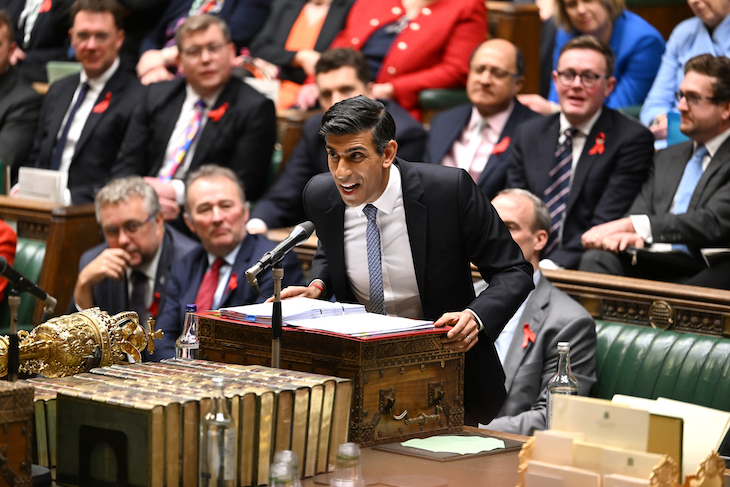Rishi Sunak will have suspected that Keir Starmer was going to bring up housebuilding at Prime Minister’s Questions today, and so he came prepared. The Labour leader has been using the Tory revolts on the Levelling Up and Regeneration Bill to build his case that the Prime Minister is weak, and today he did indeed open on the latest U-turns on housing. He said Sunak had broken the manifesto promise to build 300,000 homes without consulting voters about it, asking: ‘What changed?’
Sunak was indeed well prepared. He suggested that Starmer hadn’t ‘taken the time to read the detail of what we’re doing’, before listing two of the measures that are particularly important to Conservatives with a tendency to block planning reform: protecting greenfield sites and focusing on building on brownfield.
Starmer joked that the two ringleaders on the housing targets rebellion were unlikely to be cheering because they thought the government would be building more homes. He then went in with a new line about Sunak’s weakness: he called him the ‘blancmange Prime Minister’. This didn’t really work, even though Sunak is indeed a bit of a sheet in the wind when it comes to managing his party. Perhaps ‘pushover Prime Minister’ might stick better, given the number of U-turns. Sunak clearly suspected there would be some kind of insult coming though and had prepared a line for it, accusing Starmer of engaging in ‘petty personality politics’. Over the next two answers, the Prime Minister tried to list Conservative achievements on housebuilding across the UK, while Starmer tacked to complaining that Sunak hadn’t taken up the offer of passing the targets with Labour votes. The pair tussled over who was weaker: Labour not standing up to trade unions taking strike action and allowing Gordon Brown to have a say in the party’s policymaking process, and the Tories not averting the industrial action by ‘getting round the table’.
They moved on to the allegations about Michelle Mone, where Sunak made what appeared to be an announcement: he said ‘it’s absolutely right that she is no longer attending the House of Lords and therefore no longer has the Conservative whip.’ This made it sound as though Sunak had proactively done something to ensure that Mone wasn’t a Tory peer anymore, when in fact she announced she was taking a leave of absence, and this meant she automatically lost the whip – not that the party stripped her of the whip at any stage. After the session, the Prime Minister’s press secretary offered the clarification that Sunak had not actually taken any action against Mone. This also follows a pattern of Tory figures quitting their roles without the Prime Minister being the authoritative figure pushing them: the same happened in the case of Gavin Williamson.
Starmer finished on an issue that he correctly pointed out is worrying a lot of parents, which is the group A streptococcus outbreak. It was interesting that he made this his final question, and not merely because of its salience. It also meant there was no chance for Sunak to close his answers to the Labour leader with a prepared round-up of why the Tories were great and the Opposition useless.
There were other moments of note later in the session, including the first questions from Stephen Flynn as leader of the SNP. He paid tribute to Ian Blackford, who had the good grace to laugh when Sunak mockingly suggested everyone would miss the former leader’s contributions in the Chamber. And then Flynn asked a much more direct question than his predecessor ever did: what was the greatest achievement of the Tories since 2019? Interestingly, Sunak responded that it was the way the government kept people safe during the pandemic.
A less direct question came later from Tory backbencher Conor Burns, who has recently been cleared of allegations of misconduct. On the surface, it sounded like an MP saying he was happy to be back in the Commons and asking the PM to visit a school in his constituency, but Burns was in effect demanding that Sunak come to his seat and apologise to him for the way he was treated when the allegations were made (he was swiftly sacked by Liz Truss, and has only just had the party whip restored to him, not his government job). Sunak, similarly, gave an answer that had more to it than first met the ear. He said how ‘nice’ it was to see Burns back and that he would consider the invitation – which sounded rather like ‘don’t call us, we’ll call you’. Given how in thrall Sunak is to his backbenches, though, he should have noted that the cheers greeting Burns were much louder than for the PM when he entered the Chamber. That’s a party dynamic he won’t be able to ignore.







Comments